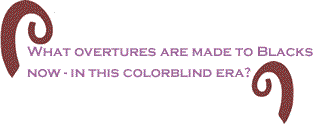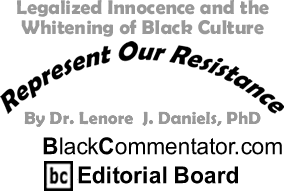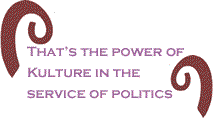
|
||||||||||||||||||||||
|
||
 |
||
Share | |
||
 |
||
I
clicked to view the lecture at C-Span online. The subject is Black
culture, Black culture in the FDR Era. The author of Black
Culture and the New Deal: The Quest for Civil Rights in the Roosevelt
Era, is young, an Assistant Professor at As a white faculty/administrator once asked me after he glanced at my proposed syllabus for a course on U.S./American literature, “what’s your perspective?” - I want to know - what’s Lauren Rebecca Sklaroff’s perspective? Black Culture examines the New Deal programs during the 1930s and 1940s and the ways
in which these programs “address racial issues of the period.”
The administration and the Democrats attempted to “reach out to
Blacks,” most of whom voted Republican. But what had the Republican
Party done for Blacks “greatly affected by the Depression”? Blacks
recognized in the Democrats “the party taking more positive steps
for social change,” and while the “It’s nothing like we see now.” Now? What overtures are made to Blacks now - in this colorblind era? The
Who is Sklaroff talking to as she looks into the camera? What interested her, Sklaroff, in this subject? “I was interested in white fascination with Blackness, with creating it and disseminating it.” Often such “images were “derogatory and demeaning and [these images served] only [as] a way for white men and women to elevate themselves.” Were? Has the commodification of derogatory images and their profiteers been outlawed now? Sklaroff
continues: Executive Secretary of the NAACP, Walter White, becomes
interested in the New Deal cultural programs. He sees these programs
as a way to take on what he calls “representational agency.” White
told the Black community: “You control how people are going to
present you. Grasp it and change it.” For Sklaroff, It was “important
to see how people feel about their own representation.” Yesterday?
In a past era when we were alive and fighting? When, as James
Baldwin observed, we Blacks staged an insurrection? The Civil
Rights era, Whites’ statement said “something” to her. What? For Black people, culture is significant! She understood, then, “where culture fits in the Black political agenda.” Pause. Pause. Pause! Memphis residents past them in the streets, and yet
didn’t see human beings at all. Then two of the men were crushed,
yet For a people whose governmental institutions continually support the dehumanization of Blackness, culture is the primary site of our political, social, and economic struggle for justice. Was it difficult, Sklaroff is asked, for you a, white, to sell a book on Black culture to a publisher?
“Most of my colleagues are white now. The nature of the field has opened up to whites.” When did it close? Who was controlling the images of Blacks, even in the 1930s and 1940s while Langston and Hurston fought their white patron to represent “authentic” Black life? All of my colleagues are white - NOW! Now! Natural. “We have to take a certain amount of liberties with what we write, what we understand!” Sklaroff said that too! Take liberties with what we understand! She’s pleased that question “doesn’t come up.” “I think we are coming to recognize the complexity of human experience.” “The complexity of human experience”! Oh, what innocent language! Watch it dancing on the tombs of our ancestors while each syllable blows us living descendants into oblivion. If we aren’t Gatekeepers, the liberties we’d take would be guided by our connectedness with and intimate knowledge of our experience as a Black people oppressed and in continual struggle - another perspective on the complexity of human experience. But that’s the power of Kulture in the service of politics for you! Take us out with gunpowder and lock us up behind prison bars. Teach our children to chant, “get rich or die trying.” Then bring on the wide-eye innocence. Soft and mellow appropriation of our way of life removed in places too high to see until it’s too late and all the “colleagues are white.” All the children of the “colleagues” hear the message and see the world is theirs, once again. Christopher Columbus again, only now he’s turning pages of our narratives, hunting for our ancestors and placing them on auction blocks as objects, once again. Nothing we own, we can call our own, can be kept from the free market. Doors closed can be opened wide on objects. A price tag is already made up and a wide-eyed innocent is waiting to consume us. There
are plenty of whites doing Black studies, Sklaroff argues. It’s
like doing Medieval Studies. No one doing Medieval Studies lived
in the Medieval Era. But scholars in the Medieval Era are white,
predominantly, most investigating the life and works of their
ancestors. Sklaroff ends by saying that she would love to know what the Blacks she featured in her book would think, but, alas, they’re dead! I fail to hear empathy here. Where’s the challenge to the claim of a democratized culture now in the 21st Century? I hear the now familiar race-neutral jargon disguising a sense of entitlement, institutionally legitimized in our racially controlled society. Where is the Struggle here? For Sklaroff and her colleagues, the Black struggle is over, for justice is over. There’s no line to cross because it doesn’t exist. No line to cross because Black people as an oppressed people don’t exist. The line and the oppressed don’t exist! Don’t mistake blind whiteness for the convictions and commitment of a Howard Zinn! This
is what counts as diversity in the
I once taught under a European-born chair of English. She, too, was a younger white woman whose similar response, equally as defensive, offered that anyone could learn of the Black experience as expressed in Black literature written by Black women. It’s all about the human experience, and Blacks, she believed, weren’t the sole authority (academic jargon) on the Black experience. And, I guess, we Black women weren’t the sole authority on our experiences as Black women! So you, Black woman, with your experience of being Black and woman, return to the margins established for your kind, margins established prior to 1964 and 1965. We’ll be the authority selecting and tweaking images of the Black experience suitable to our interests in maintaining the appropriate images of Empire for the appropriate markets. Do
you want my experience of oppression as a Black in the In
race-neutral language, the hunters maintain their position as
authorities on the hunted. The resurgence of innocence
in the 21st Century paves the way for white and Black scholars
to collaborate in the corporate-led corruption for the ultimate
vanquishing of our cultural heritage and our cultural caretakers.
However
powerful the forces of these imperialist truth-grab institutions
today, some of us still hear and feel the pain of Sojourner Truth
crying in the wilderness. Nurtured innocence, manufactured
in secluded libraries in these high places of learning,
will never understand why Langston and his song - “Black/As the
gentle night/Black/As the kind and quiet night/Black/As the deep
productive earth/Body/Out of
|
||
| Text | ||
Share | |
||
 |
||
If you would like to comment on this article, please do so below. There is a 400 character limit. You do not need a FaceBook account. Your comment will be posted here on BC instantly. Thanks. Entering your email address is not mandatory. You may also choose to enter only your first name and your location.
|
||
Thank you very much for your readership. |
||
| Any BlackCommentator.com article may be re-printed so long as it is re-printed in its entirety and full credit given to the author and www.BlackCommentator.com. If the re-print is on the Internet we additionally request a link back to the original piece on our Website. | ||
| |
||
May 27, 2010 |
| Executive Editor: David A. Love, JD |
| Managing Editor: Nancy Littlefield |
| Publisher: Peter Gamble |
| Est. April 5, 2002 |
| Printer Friendly Version in resizeable plain text format |
 |
 |

|
 |
| |
| |



































 Asked
to name some of the beneficiaries of funds from the federal projects,
Sklaroff mentions Lena Horne, Butterfly McQueen, Ethel Waters,
and Sterling Brown and Langston Hughes of the Harlem Renaissance
period. However, she adds, lesser known Black artists, writers,
and intellectuals could benefit from scholarship.
Asked
to name some of the beneficiaries of funds from the federal projects,
Sklaroff mentions Lena Horne, Butterfly McQueen, Ethel Waters,
and Sterling Brown and Langston Hughes of the Harlem Renaissance
period. However, she adds, lesser known Black artists, writers,
and intellectuals could benefit from scholarship.
 Was
it difficult, and I would have added - in a post-racial, colorblind
era, was it difficult for you to sell a publisher (a white publisher)
a book about Black Culture?
Was
it difficult, and I would have added - in a post-racial, colorblind
era, was it difficult for you to sell a publisher (a white publisher)
a book about Black Culture?
 Scholars
of Shakespeare are predominantly white; scholars of the Enlightenment
period are predominantly white. Now - increasingly, the scholars
of Black Studies are white scholars. Will white scholars dominate
Black Studies one day? Does the thought of living Black
writers, artists, and intellectuals in Black Studies disturb this
young scholar? If she truly admired our people, if she truly is
concerned about the fate of our representation in history, and
if she truly loved my people, she would have considered the question
she seems to reject and hopes she never has to answer again. And
the question is why her? What is her interest in Black
culture? Will any of these post-racial scholars and teachers empower
young Black students by validating their current but silenced
experience of being Black and young in the
Scholars
of Shakespeare are predominantly white; scholars of the Enlightenment
period are predominantly white. Now - increasingly, the scholars
of Black Studies are white scholars. Will white scholars dominate
Black Studies one day? Does the thought of living Black
writers, artists, and intellectuals in Black Studies disturb this
young scholar? If she truly admired our people, if she truly is
concerned about the fate of our representation in history, and
if she truly loved my people, she would have considered the question
she seems to reject and hopes she never has to answer again. And
the question is why her? What is her interest in Black
culture? Will any of these post-racial scholars and teachers empower
young Black students by validating their current but silenced
experience of being Black and young in the  The
enslavement of Blacks and Black insurrection in the 1950s and
1960s is a usable legacy for the American Empire. Our evolution
as human beings hasn’t any value to the Empire.
The
enslavement of Blacks and Black insurrection in the 1950s and
1960s is a usable legacy for the American Empire. Our evolution
as human beings hasn’t any value to the Empire.









